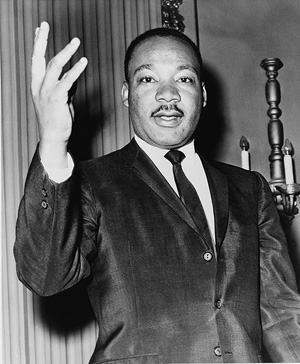Evaluating How Voice and
Language Support a Position

Source: Martin Luther King, Jr, Dick DeMarsico, Wikimedia Commons
Words and ideas are not the only ways speakers support their ideas. Articulate speakers use their voices and language to add energy to their speeches and to emphasize their ideas.
Dr. Martin Luther King Jr. was known to be one of the best orators of the twentieth century. He was a master at using metaphor, parallelism, and voice to express powerful ideas and to influence his audience.
The clip linked below is from Dr. King’s last speech. It was made the day before Dr. King was assassinated. The speech, made in Memphis, Tennessee, supported sanitation workers who were marching against an unjust ruling.
As you watch, listen for Dr. King’s use of the following delivery techniques:
|
Delivery techniques |
Effects |
| Pauses |
Pauses allow listeners to think through ideas. |
| Voice |
Variations in volume assist in stressing ideas and expressing enthusiasm. |
| Metaphors and symbolism |
Metaphors and symbols can help the audience understand a point. |
| Repetition and parallelism |
Repetition helps the speaker stress ideas. |
| Vocabulary |
Precise and strong vocabulary can make a speaker sound intelligent or knowledgeable. |
Click Here to watch the Martin Luther King Jr. speech.
Using your notes, write your responses to the questions below. When you are finished, check your understanding.
- How do Dr. King’s pauses, pace, and voice affect the audience?
- How do Dr. King’s metaphors and symbolism affect the audience?
- Which words and ideas does Dr. King repeat? Why does he repeat these ideas?
- How does Dr. King’s vocabulary support his position?
Sample Responses:
- His pauses and slow pace add drama to his ideas. His voice is powerful and confident. These empower the audience.
- They connect him to the audience who would understand and appreciate his comparisons.
- He repeats the word “freedom” so that the people in the audience and other people listening will understand the importance of his speech and the struggle for Civil Rights. He repeats “mountaintop” to show people that he believes that they will succeed with God’s help.
- His vocabulary is that of ordinary people for the most part. Occasionally, he will use a word that will demonstrate how well educated and well read he is. His speech is such that it connects with his audience easily.